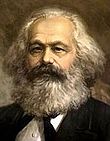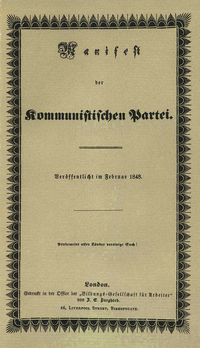The Communist Manifesto
| Part of a series on |
| Marxist theory |
|---|
 |
Contents[show] |
[edit] Authorship
Friedrich Engels has often been credited in composing the first drafts, which led to The Communist Manifesto. In July 1847, Engels was elected into the Communist League, where he was assigned to draw up a catechism. This became the Draft of a Communist Confession of Faith. The draft contained almost two dozen questions that helped express the ideas of both Engels and Karl Marx at the time. In October 1847, Engels composed his second draft for the Communist League entitled, The Principles of Communism. The text remained unpublished until 1914, despite its basis for The Manifesto. From Engels's drafts Marx was able to write, once commissioned by the Communist League, The Communist Manifesto, where he combined more of his ideas along with Engels's drafts and work, The Condition of the Working Class in England.[3]Although the names of both Engels and Karl Marx appear on the title page alongside the "persistent assumption of joint-authorship", Engels, in the preface introduction to the 1883 German edition of the Manifesto, said that the Manifesto was "essentially Marx's work" and that "the basic thought... belongs solely and exclusively to Marx."[4]
Engels wrote after Marx's death,
"I cannot deny that both before and during my forty years' collaboration with Marx I had a certain independent share in laying the foundations of the theory, but the greater part of its leading basic principles belong to Marx....Marx was a genius; we others were at best talented. Without him the theory would not be by far what it is today. It therefore rightly bears his name."[5]Despite Engels's modesty in these two quotations, in fact he made major contributions to the Manifesto, starting with the suggestion to abandon "the form of a catechism and entitle it the Communist Manifesto." Moreover, Engels joined Marx in Brussels for the writing of the Manifesto. There is no evidence of what his contributions to the final writing were, but the Manifesto bears the stamp of Marx's more rhetorical writing style. Nevertheless, it seems clear that Engels's contributions justify his name's appearance on the title page after Marx's.[6]
[edit] Textual history
The Communist Manifesto was first published (in German) in London by a group of German political refugees in 1848. It was also serialised at around the same time in a German-language London newspaper, the Deutsche Londoner Zeitung.[7] The first English translation was produced by Helen Macfarlane in 1850. The Manifesto went through a number of editions from 1872 to 1890; notable new prefaces were written by Marx and Engels for the 1872 German edition, the 1882 Russian edition, the 1883 French edition, and the 1888 English edition. This edition, translated by Samuel Moore with the assistance of Engels, has been the most commonly used English text since.However, some recent English editions, such as Phil Gasper's annotated "road map" (Haymarket Books, 2006), have used a slightly modified text in response to criticisms of the Moore translation made by Hal Draper in his 1994 history of the Manifesto, The Adventures of the "Communist Manifesto" (Center for Socialist History, 1994).
[edit] Contents
The Manifesto is divided into an introduction, three substantive sections, and a conclusion.[edit] Preamble
The introduction begins with the notable comparison of communism to a "spectre", claiming that across Europe communism is feared, but not understood, and thus communists ought to make their views known with a manifesto:- A spectre is haunting Europe—the spectre of Communism. All the Powers of old Europe have entered into a holy alliance to exorcise this spectre: Pope and Czar, Metternich and Guizot, French Radicals and German police-spies.
- Where is the opposition party that has not been decried as Communist by its opponents in power? Where is the opposition party that has not hurled back the branding reproach of Communism, against the more advanced opposition parties, as well as against its reactionary adversaries?[8]
[edit] I. Bourgeois and Proletarians
The first section, "Bourgeois and Proletarians", puts forward Marx's neo-Hegelian version of history, historical materialism, claiming that- The history of all hitherto existing society is the history of class struggles.
- Freeman and slave, patrician and plebeian, lord and serf, guild-master and journeyman, in a word, oppressor and oppressed, have stood in constant opposition to one another, carried on an uninterrupted, now hidden, now open fight, a fight that each time ended either in a revolutionary re-constitution of society at large, or in the common ruin of the contending classes.
- The bourgeoisie, wherever it has got the upper hand, has put an end to all feudal, patriarchal, idyllic relations. It ... has left remaining no other nexus between man and man than naked self-interest, than callous “payment in cash” ... for exploitation, veiled by religious and political illusions, it has substituted naked, shameless, direct, brutal exploitation ... Constant revolutionizing of production, uninterrupted disturbance of all social conditions, everlasting uncertainty and agitation distinguish the bourgeois epoch from all earlier ones ... All that is solid melts into air, all that is holy is profaned, and man is at last compelled to face with sober senses, his real conditions of life, and his relations with his kind.
- The essential condition for the existence and rule of the bourgeois class is the accumulation of wealth in private hands, the formation and increase of capital; the essential condition of capital is wage-labour. Wage-labour rests entirely on the competition among the workers.
[edit] II. Proletarians and Communists
The second section, "Proletarians and Communists," starts by outlining the relationship of conscious communists to the rest of the working class:- The Communists do not form a separate party opposed to other working-class parties.
- They have no interests separate and apart from those of the proletariat as a whole.
- They do not set up any sectarian principles of their own, by which to shape and mould the proletarian movement.
- The Communists are distinguished from the other working-class parties by this only: 1. In the national struggles of the proletarians of the different countries, they point out and bring to the front the common interests of the entire proletariat, independently of all nationality. 2. In the various stages of development which the struggle of the working class against the bourgeoisie has to pass through, they always and everywhere represent the interests of the movement as a whole.
The section ends by outlining a set of short-term demands:
- Abolition of property in land and application of all rents of land to public purposes.
- A heavy progressive or graduated income tax.
- Abolition of all right of inheritance.
- Confiscation of the property of all emigrants and rebels.
- Centralisation of credit in the hands of the State, by means of a national bank with State capital and an exclusive monopoly.
- Centralisation of the means of communication and transport in the hands of the State.
- Extension of factories and instruments of production owned by the State; the bringing into cultivation of waste-lands, and the improvement of the soil generally in accordance with a common plan.
- Equal liability of all to labour. Establishment of industrial armies, especially for agriculture.
- Combination of agriculture with manufacturing industries; gradual abolition of the distinction between town and country, by a more equitable distribution of the population over the country.
- Free education for all children in public schools. Abolition of children's factory labour in its present form. Combination of education with industrial production.[9]
One particularly controversial passage deals with this transitional period:
- When, in the course of development, class distinctions have disappeared, and all production has been concentrated in the hands of a vast association of the whole nation, the public power will lose its political character. Political power, properly so called, is merely the organized power of one class for oppressing another. If the proletariat during its contest with the bourgeoisie is compelled, by the force of circumstances, to organize itself as a class, if, by means of a revolution, it makes itself the ruling class, and, as such, sweeps away by force the old conditions of production, then it will, along with these conditions, have swept away the conditions for the existence of class antagonisms and of classes generally, and will thereby have abolished its own supremacy as a class.
In a related dispute, later Marxists make a separation between "socialism", a society ruled by workers, and "communism", a classless society. Engels wrote little and Marx wrote less on the specifics of the transition to communism, so the authenticity of this distinction remains a matter of dispute.
[edit] III. Socialist and Communist Literature
The third section, "Socialist and Communist Literature," distinguishes communism from other socialist doctrines prevalent at the time the Manifesto was written. While the degree of reproach of Marx and Engels toward rival perspectives varies, all are eventually dismissed for advocating reformism and failing to recognize the preeminent role of the working class. Partly because of Marx's critique, most of the specific ideologies described in this section became politically negligible by the end of the nineteenth century.[edit] IV. Position of the Communists in Relation to the Various Opposition Parties
The concluding section, "Position of the Communists in Relation to the Various Opposition Parties," briefly discusses the communist position on struggles in specific countries in the mid-nineteenth century such as France, Switzerland, Poland, and Germany. It then ends with a declaration of support for other communist revolutions and a call to action:- In short, the Communists everywhere support every revolutionary movement against the existing social and political order of things.
- The Communists disdain to conceal their views and aims. They openly declare that their ends can be attained only by the forcible overthrow of all existing social conditions. Let the ruling classes tremble at a Communist revolution. The proletarians have nothing to lose but their chains. They have a world to win.
-
Workers of the world, unite!
[edit] See also
- Communism
- Erwin Schulhoff (created a music version of The Communist Manifesto)
- List of current communist states
- Wage slavery
[edit] References
- ^ Seymour-Smith, Maerin (1998). The 100 Most Influential Books Ever Written: The History of Thought from Ancient Times to Today. Secaucus, NJ: Citadel Press.
- ^ The Great Philosophers, by Jeremy Stangroom and James Garvey, Arcturus 2005/ 2008 ISBN 978-1-84837-018-0, pp160 UKP9.99
- ^ Marx's General: The Revolutionary Life of Friedrich Engels, by Tristram Hunt, Metropolitan Books 2009 ISBN 978-0-8050-8025-4,pg. 142-44
- ^ Marx and Engels, The Communist Manifesto, introduction by Martin Malia (New York: Penguin group, 1998), pg. 35 ISBN 0-451-52710-0
- ^ Marx's General: The Revolutionary Life of Friedrich Engels, by Tristram Hunt, Metropolitan Books 2009 ISBN 978-0-8050-8025-4,pg. 117
- ^ The Life and Thought of Friedrich Engels: A Reinterpretation, by J.D. Hunley, Yale University Press 1991 ISBN 0-300-04923-4,pg. 65-79 (quotation pg. 66) for an extended discussion of the two men's contributions
- ^ Kuczynski, Thomas, Das kommunistische Manifest (Manifest der Kommunistischen Partei) von Karl Marx und Friedrich Engels: von der Erstausgabe zur Leseausgabe, mit einer Editionsbericht (Trier, 1995).
- ^ :wikisource:Manifesto of the Communist Party
- ^ The Communist Manifesto at Project Gutenberg accessed on January 24, 2007
[edit] External links

Wikisource has original text related to this article: - Full text of The Communist Manifesto English edition of 1888 from the Marxists Internet Archive in all formats: PDF, Audio, HTML, Word, Text, etc.
- The Communist Manifesto at Project Gutenberg — English edition of 1888, edited by Friedrich Engels
- Free audiobook from LibriVox
- A Marxism resource page
- Only remaining page of the first draft of the Manifesto in Marx's handwriting from the Marx papers at the International Institute of Social History.
- Images of English versions
- The Communist Manifesto (Full Version in Google Books)
- The Communist Manifesto 160 Years Later by Michael Löwy



